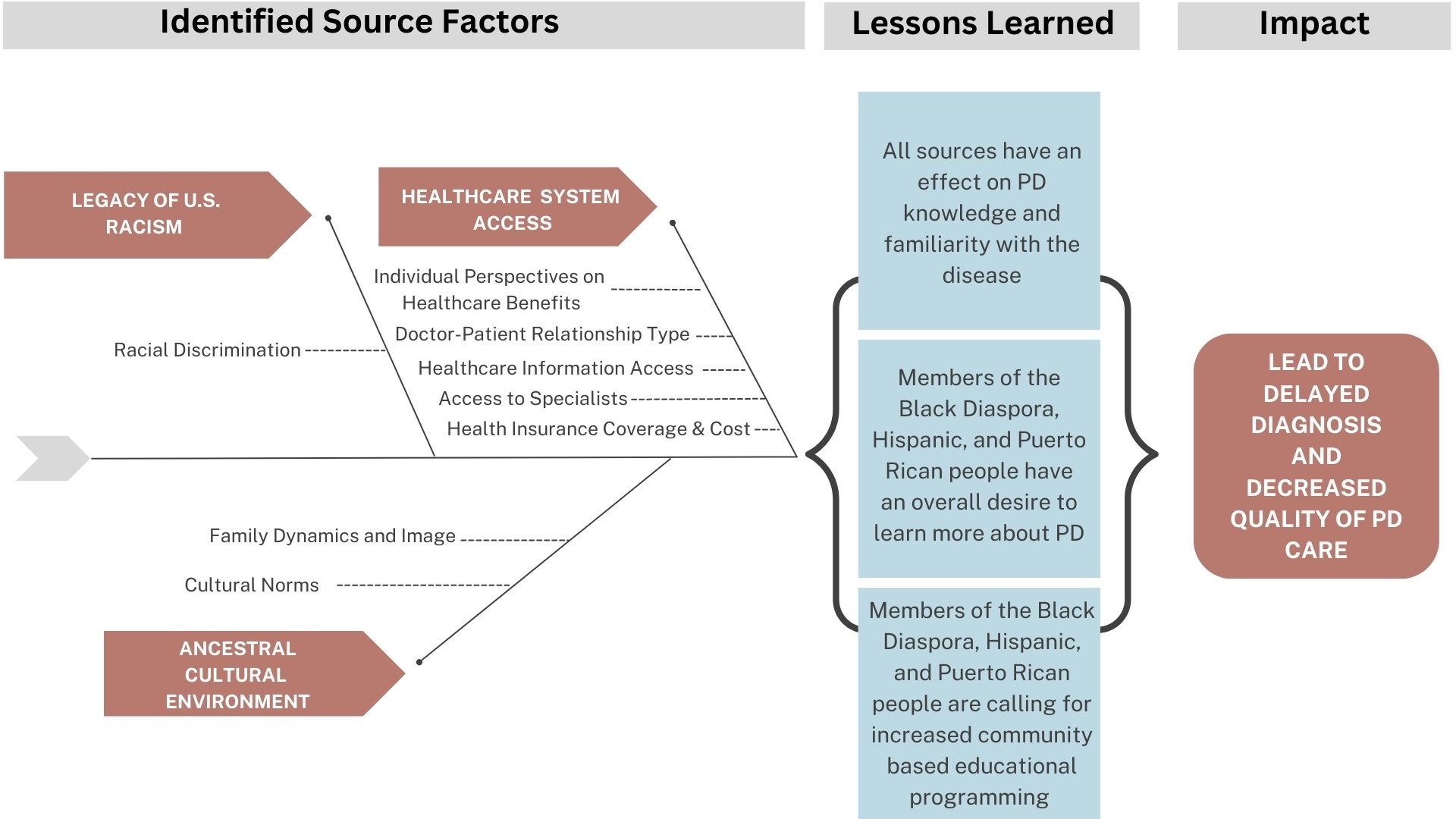Category: Education in Movement Disorders
Objective: To identify barriers and facilitators to care for members of the Black Diaspora (MBD) and Hispanic people affected by Parkinson Disease (PD). To identify modifiable barriers as a means to improve engagement in neurological care for MBD and Hispanic people with PD (PwP).
Background: PD is the second most common neurodegenerative disease and early diagnosis can significantly improve outcome prognosis. MBD and Hispanic people are less likely to receive a timely diagnosis following onset of symptoms and more likely to experience greater disease severity [1]. Historically marginalized populations (i.e. MBD, Hispanic, and Latinx communities) are not accurately represented in research; this, along with many other barriers, compounds underreporting and lack of recognition of PD [2]. As a first step to improve outcome prognosis for MBD and Hispanic PwP, it is important to understand barriers to early diagnosis and healthcare access from the communities’ perspectives.
Method: We conducted two focus groups over Zoom to identify barriers and facilitators to healthcare-seeking behavior in PwP. Our team collaborated with community partners for recruitment, data collection, and data analysis to facilitate a trusting relationship with the community and participants [3].
Results: We enrolled 15 participants (66.6 ± 11.3 years old; 13 female; 60% African American/Black, 7% Hispanic, 13% Puerto Rican, 7% Mixed race, 7% African, 7% unreported) for two focus groups. Discussions revealed sources of barriers to care engagement in three main domains: legacy of racism in the United States, ancestral cultural environment, and healthcare system access. These sources influenced individuals’ PD knowledge and familiarity. Additionally, participants expressed a desire to know more about PD and called for increased community-based programming for education and awareness.
Conclusion: We used a community-based participatory research approach to describe the experiences of MBD and Hispanic people in Manhattan in relation to possible sources of healthcare disparities and delayed PD diagnosis. These sources have broad implications and should be addressed through collaborative community programming.
Multi-pronged effects of identified sources
References: [1] N. Dahodwala, J. Karlawish, A. Siderowf, J.E. Duda, D.S. Mandell, Delayed Parkinson’s Disease Diagnosis among African-Americans: The Role of Reporting of Disability, Neuroepidemiology 36 (2011) 150–154. https://doi.org/10.1159/000324935.
[2] K. Nuytemans, C.P. Manrique, A. Uhlenberg, W.K. Scott, M.L. Cuccaro, C.C. Luca, C. Singer, J.M. Vance, Motivations for Participation in Parkinson Disease Genetic Research Among Hispanics versus Non-Hispanics, Front. Genet. 10 (2019) 658. https://doi.org/10.3389/fgene.2019.00658.
[3] D. Kipnis, A. Pacheco, D. Delfing, N. Toomer-Mensah, C.E. Macpherson, J. Rieger, A. Parker, R.B. Coley, D. Coley, H. Shah, L. Quinn, Community-based participatory research approach to address healthcare disparities confronting members of the Black Diaspora with Parkinson’s disease, Parkinsonism Relat Disord 119 (2024) 105936. https://doi.org/10.1016/j.parkreldis.2023.105936.
To cite this abstract in AMA style:
D. Kipnis, M. Lin, A. Pacheco, N. Mensah, Y. Gu, C. Macpherson, K. Kempner, A. Parker, RB. Coley, D. Coley, H. Shah, L. Quinn. Identifying Barriers and Facilitators to Accessing Care for Members of the Black Diaspora and Hispanic People Affected by Parkinson Disease: A Qualitative Study [abstract]. Mov Disord. 2024; 39 (suppl 1). https://www.mdsabstracts.org/abstract/identifying-barriers-and-facilitators-to-accessing-care-for-members-of-the-black-diaspora-and-hispanic-people-affected-by-parkinson-disease-a-qualitative-study/. Accessed April 21, 2025.« Back to 2024 International Congress
MDS Abstracts - https://www.mdsabstracts.org/abstract/identifying-barriers-and-facilitators-to-accessing-care-for-members-of-the-black-diaspora-and-hispanic-people-affected-by-parkinson-disease-a-qualitative-study/

